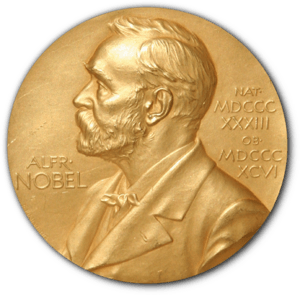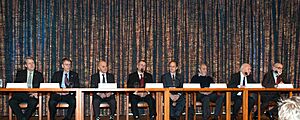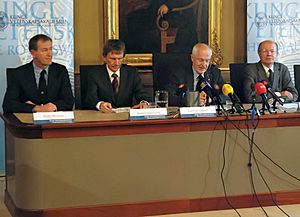Nobel Memorial Prize in Economic Sciences facts for kids
Quick facts for kids The Sveriges Riksbank Prize in Economic Sciences in Memory of Alfred Nobel |
|
|---|---|

Nobel Prize Medal
|
|
| Presented by | Nobel Foundation, Royal Swedish Academy of Sciences |
| Location | Stockholm, Sweden |
| Country | Sweden |
| Reward | 11 million Swedish kronor (2023) |
| First awarded | 1969 |
| Last awarded | present |
| Currently held by | |
The Sveriges Riksbank Prize in Economic Sciences in Memory of Alfred Nobel, often called the Nobel Prize in Economics, is a very important award. It recognizes amazing work in economic sciences. This field studies how societies use resources, make goods, and manage money. The Nobel Foundation helps manage this prize.
The Swedish central bank, Sveriges Riksbank, created the prize in 1968. They did this to celebrate their 300th anniversary. It also honors Alfred Nobel, who started the original Nobel Prizes. Even though Alfred Nobel did not include economics in his first will, this prize is now part of the Nobel Prize family. Winners are chosen and announced just like the other Nobel laureates. They receive their awards at the same special ceremony.
The Royal Swedish Academy of Sciences chooses the winners for the Economics Prize. This is the same group that selects winners for the Physics and Chemistry prizes. The very first Economics Prize was given in 1969. It went to Jan Tinbergen from the Netherlands and Ragnar Frisch from Norway. They won for creating new ways to understand how economies change over time.
Contents
Understanding the Nobel Prize in Economics
How the Prize Began
The Sveriges Riksbank bank set up a special fund to pay for this prize forever. This fund covers all the costs for the Nobel Foundation to manage the award. It also provides the money that winners receive. In 2023 and 2024, the prize money was 11 million Swedish kronor. This is the same amount given for the other Nobel Prizes.
Since 2006, Sveriges Riksbank has given money each year to the Nobel Foundation. This helps with the prize's administrative costs. It also helps share information about the award on the Nobel Foundation's official websites.
Who Funds This Important Award?
It is important to know that the Prize in Economic Sciences was not part of Alfred Nobel's original will. He created five other prizes. However, the way winners are nominated, chosen, and given the award is very similar to the original Nobel Prizes.
The winners are announced at the same time as other Nobel laureates. They also receive their awards at the same ceremony. The Royal Swedish Academy of Sciences follows the same rules for this prize. These rules say the prize should go to those who have "conferred the greatest benefit on mankind."
Choosing the Winners: The Selection Process
The Royal Swedish Academy of Sciences is a respected organization. It helps scientists from different countries work together. It also publishes many scientific journals. Every year, the Academy chooses the winners for the Nobel Prizes in Physics and Chemistry. They also choose the winner for the Prize in Economic Sciences, along with other important awards.
Who Can Be Nominated?
Each September, a special committee for the Economics Prize starts its work. This committee has five members. They send invitations to thousands of experts around the world. These experts include scientists, academy members, and university professors. They are asked to suggest candidates for the prize for the next year. Members of the Academy and past winners can also nominate people.
All suggestions and their supporting information must arrive by February 1st. The Prize Committee and other experts carefully review these suggestions.
How Winners Are Decided
Before the end of September, the committee selects a few potential winners. If there is a tie, the committee's chairman makes the final decision.
In mid-October, members of the Royal Swedish Academy of Sciences vote. They decide who will receive the Prize in Economics. Just like with the other Nobel Prizes, no more than three people can share the prize in one year. The winners must also be alive when the prize is announced in October. Information about who was nominated stays secret for 50 years.
On December 10th, the anniversary of Alfred Nobel's death, a special ceremony takes place in Stockholm. The King of Sweden presents each winner with a diploma, a gold medal, and a document for their prize money. This is the same for winners in physics, chemistry, physiology or medicine, literature, and economics.
Amazing Winners of the Economics Prize

The first Economics Prize was given in 1969 to Ragnar Frisch and Jan Tinbergen. They were recognized for their work on understanding economic processes. Since then, many brilliant minds have received this honor.
Three women have won the prize so far. Elinor Ostrom won in 2009. Esther Duflo won in 2019. Most recently, Claudia Goldin won in 2023. Claudia Goldin was the first woman to win the award by herself.
Not Just Economists!
In 1995, the Economics Prize was updated to include a wider range of social sciences. This meant that researchers in fields like political science, psychology, and sociology could also be considered. The committee that chooses the winners also started to include experts from outside of economics.
For example, Herbert A. Simon, who studied political science, won the prize in 1978. He was recognized for his work on economics and how organizations make decisions. Elinor Ostrom, another political scientist, won in 2009. Also, Daniel Kahneman, a psychology professor, won for his work in behavioral economics. This shows that important contributions can come from many different areas of study.
See also
 In Spanish: Premio de Economía Conmemorativo de Alfred Nobel para niños
In Spanish: Premio de Economía Conmemorativo de Alfred Nobel para niños
- List of economics awards
- List of Nobel laureates by country
- List of prizes known as the Nobel of a field
- List of prizes named after people
- Mont Pelerin Society
 | William M. Jackson |
 | Juan E. Gilbert |
 | Neil deGrasse Tyson |


